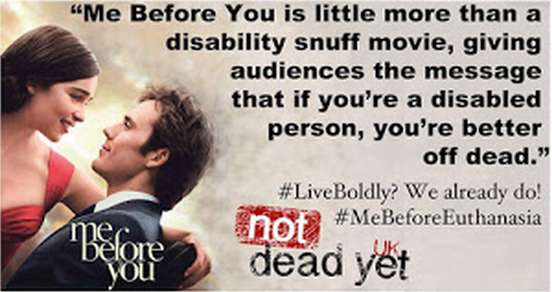Yes, Me Before You is fiction – but so are most arguments for assisted suicide
 The Telegraph 4 June 2016
The Telegraph 4 June 2016
Family First Comment: “The closer to reality of death and dying, the less support there is for legalising assisted suicide. Whereas a majority of the British public believe they need the “right” to die, the percentages go down in accordance to experience of death and dying. Less than half of all doctors support legalised assisted suicide. Of hospice doctors, 90 per cent oppose legalisation of assisted suicide. The closer to reality of death and dying, the less support there is for legalising assisted suicide. Whereas a majority of the British public believe they need the “right” to die, the percentages go down in accordance to experience of death and dying. Less than half of all doctors support legalised assisted suicide. Of hospice doctors, 90 per cent oppose legalisation of assisted suicide.”
There is an outbreak of fictional assisted suicides, of which the film released this week, Me Before You, is simply the most recent example. Before, we had Million Dollar Baby, The Sea Inside, One True Thing, and episodes of Lena Dunham’s Girls, Coronation Street, and Hollyoaks. Such a plot-device is neither new nor “taboo-busting” – that taboo has been well and truly busted.
It is interesting that the case for assisted suicide exists more in the fevered imagination of authors and screenwriters than in reality. Only a handful of Britons kill themselves in Swiss assisted suicide clinics every year; the rate of fictional representations to people actually killing themselves in Switzerland must be nearly 1:1. But Me Before You has sparked protests, mostly from disabled groups, because it implicitly asks the question: If you were quadriplegic (or severely disabled), would/should you kill yourself?
Of course, the film is fiction and not particularly imaginative fiction at that, but there is a real context to the unease of groups of disabled activists like Not Dead Yet who have protested outside cinemas. Canadians with a “grievous and irremediable” medical condition (an illness, disease or disability) will soon be eligible for assisted deaths. The message is clear: don’t commit suicide. Unless you are disabled or elderly, in which case we may help you.
The whole case for assisted suicide is fictional. Rather than empathy, it is based on anxiety in the worried well. “I’d rather die than suffer like you do”, some actually say out loud to disabled people, who, in my experience are a feisty lot who enjoy (and all too often must fight for) their lives. There are real disabled lives – and there is the narcissistic projection of gloomy imaginings onto the disabled.
The case for legalised assisted suicide has at its heart a fictional scene – a relative near the end of her life wracked with pain, betubed and hooked up to beeping machines, looks pleadingly to her anxious family who in turn look to the doctor, who shakes her head sadly, constrained by a law founded on outdated religious mores.
READ MORE: http://www.telegraph.co.uk/films/2016/06/04/yes-me-before-you-is-fiction—but-so-are-most-arguments-for-ass/







